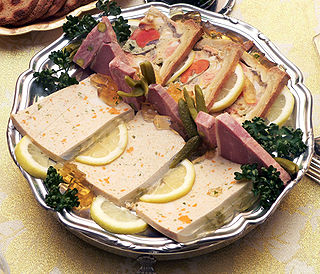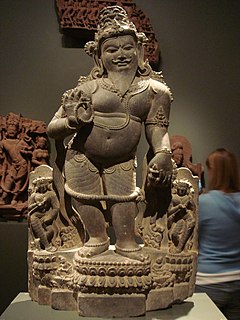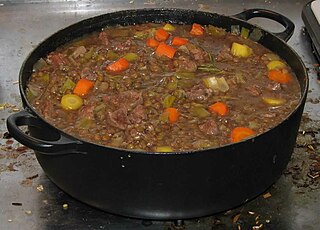Related Research Articles
Venison originally meant the meat of a game animal but now refers primarily to the meat of antlered ungulates such as elk or deer. Venison can be used to refer to any part of the animal, so long as it is edible, including the internal organs. Venison, much like beef or pork, is categorized into specific cuts, including roast, sirloin, and ribs.

Offal, also called variety meats, pluck or organ meats, is the organs of a butchered animal. The word does not refer to a particular list of edible organs, which varies by culture and region, but usually excludes muscle. Offal may also refer to the by-products of milled grains, such as corn or wheat.

Sausage casing, also known as sausage skin or simply casing, is the material that encloses the filling of a sausage. Natural casings are made from animal intestines or skin; artificial casings, introduced in the early 20th century, are made of collagen and cellulose. The material is then shaped via a continuous extrusion process – producing a single sausage casing of indefinite length – which is then cut into desired lengths, usually while the extrusion process continues.

Irish stew is a stew native to Ireland that is traditionally made with root vegetables and lamb or mutton, but also commonly with beef. As in all traditional folk dishes, the exact recipe is not consistent from time to time, or place to place. Basic ingredients include lamb, or mutton, as well as potatoes, onions, and parsley. It may sometimes also include carrots. Irish stew is also made with kid.
Irish stew is a celebrated Irish dish, yet its composition is a matter of dispute. Purists maintain that the only acceptable and traditional ingredients are neck mutton chops or kid, potatoes, onions, and water. Others would add such items as carrots, turnips and pearl barley; but the purists maintain that they spoil the true flavour of the dish. The ingredients are boiled and simmered slowly for up to two hours. Mutton was the dominant ingredient because the economic importance of sheep lay in their wool and milk produce and this ensured that only old or economically non-viable animals ended up in the cooking pot, where they needed hours of slow cooking. Irish stew is the product of a culinary tradition that relied almost exclusively on cooking over an open fire. It seems that Irish stew was recognised as early as about 1800.
Paratuberculosis is a contagious, chronic and sometimes fatal infection that primarily affects the small intestine of ruminants. It is caused by the bacterium Mycobacterium avium subspecies paratuberculosis. Infections normally affect ruminants, but have also been seen in a variety of nonruminant species, including rabbits, foxes, and birds. Horses, dogs, and nonhuman primates have been infected experimentally. Paratuberculosis is found worldwide, with some states in Australia being the only areas proven to be free of the disease. At least in Canada, the signs of BJD usually start when cattle are four to seven years of age, and then usually only are diagnosed in one animal at a time. Cattle "with signs of Johne’s disease shed billions of bacteria through their manure and serve as a major source of infection for future calves."
The Pirbright Institute is a research institute in Surrey, England, dedicated to the study of infectious diseases of farm animals. It forms part of the UK government's Biotechnology and Biological Sciences Research Council (BBSRC). The institute employs scientists, vets, PhD students and operations staff.

The British Heart Foundation (BHF) is a cardiovascular research charity in the United Kingdom. It funds medical research related to heart and circulatory diseases and their risk factors, and runs influencing work aimed at shaping public policy and raising awareness.
Pithing is a technique used to immobilize or kill an animal by inserting a needle or metal rod into its brain.

Nādi Astrology is a form of Dharma astrology practised in Tamil Nadu and adjacent regions in India. It is based on the belief that the present lives of many humans were foreseen by Hindu sages in ancient times.
AHDB Potatoes, previously known as the Potato Council, is a trade organisation that aims to develop and promote the potato industry in Great Britain. Previously an independent non-departmental public body, it has been a division of the Agriculture and Horticulture Development Board since 1 April 2008.
The British Department for Environment, Food and Rural Affairs (DEFRA) has funded 27 Farm Health Planning projects, known as the Cattle Health Project. This included four bids from the National Animal Disease Information Service (NADIS). The purpose of these projects is to promote Farm Health Planning to the wider agricultural industry.
EBLEX, now called AHDB Beef and Lamb is a division of the Agriculture and Horticulture Development Board (AHDB) and delivers services to beef and lamb levy payers in England. It exists to enhance the competitiveness and sustainability of the English beef and lamb sector. It was renamed Beef and Lamb in June 2015. Its functions and aims remain unchanged.

Bovine spongiform encephalopathy (BSE), commonly known as mad cow disease, is an incurable and inevitably fatal neurodegenerative disease of cattle. Symptoms include abnormal behavior, trouble walking, and weight loss. Later in the course of the disease the cow becomes unable to function normally. The time between infection and onset of symptoms is generally four to five years. Time from onset of symptoms to death is generally weeks to months. Spread to humans is believed to result in variant Creutzfeldt–Jakob disease (vCJD). As of 2018, a total of 231 cases of vCJD had been reported globally.

Meat on the bone, also called bone-in meat is meat that is sold with some or all of the bones included in the cut or portion, i.e. meat that has not been filleted. The phrase "on the bone" can also be applied to specific types of meat, most commonly ham on the bone, and to fish. Meat or fish on the bone may be cooked and served with the bones still included or the bones may be removed at some stage in the preparation.
The Agriculture and Horticulture Development Board (AHDB) is a levy board funded by farmers and growers and some other parts of the supply chain. It aims to enhance farm business efficiency and competitiveness in the areas of: pig, beef and lamb production in England; milk, potatoes and horticulture in Great Britain; and cereals and oilseeds in the United Kingdom. It undertakes research and development and farm-level knowledge transfer activity, provides essential market information to improve supply chain transparency and undertakes marketing promotion activities to help stimulate demand and to develop export markets. These are activities which most individual farm businesses could not afford to do themselves.
The National Sheep Association (NSA) is the trade association in the UK for sheep farming.
Quality Meat Scotland (QMS) is an executive non-departmental public body of the Scottish Government. It promotes the red meat sector and markets the Protected Geographical Indication Scotch Beef and Scotch Lamb brands.
The Moredun Research Institute is a scientific research institution based at the Pentlands Science Park, in the Bush Estate area of Midlothian, Scotland. It conducts research into diseases of farm livestock and the promotion of animal health and welfare.

A stew is a combination of solid food ingredients that have been cooked in liquid and served in the resultant gravy. Ingredients in a stew can include any combination of vegetables and may include meat, especially tougher meats suitable for slow-cooking, such as beef, pork, lamb, poultry, sausages, and seafood. While water can be used as the stew-cooking liquid, stock is also common. A small amount of red wine is sometimes added for flavour. Seasoning and flavourings may also be added. Stews are typically cooked at a relatively low temperature, allowing flavours to mingle.

The United Kingdom was afflicted with an outbreak of Bovine spongiform encephalopathy, and its human equivalent variant Creutzfeldt–Jakob disease (vCJD), in the 1980s and 1990s. Over four million head of cattle were slaughtered in an effort to contain the outbreak, and 178 people died after contracting vCJD through eating infected beef. A political and public health crisis resulted, and British beef was banned from export to numerous countries around the world, with some bans remaining in place until as late as 2019.